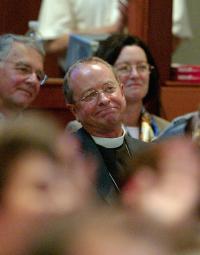Issue Date: August 15, 2003
Approval of election of openly gay bishop provokes walkout By RELIGION NEWS SERVICE American Episcopalians struggled with the confirmation of an openly gay bishop and blessings of same-sex unions during their General Convention July 30-Aug. 8 and may have inched closer to a schism after a small but influential bloc of conservative bishops and laity declared the church “apostate” and walked out of the meeting Aug. 6. Several priests and lay delegates, upset by an Aug. 6 vote that approved the Rev. V. Gene Robinson of New Hampshire as the church’s first openly gay bishop, appealed for “intervention” by the archbishop of Canterbury and other Anglican leaders. “Understand this clearly,” said the Rev. Kendall Harmon of South Carolina, a leading conservative. “We are not leaving the church. It is rather this church which has left the historic faith and has fractured the Anglican Communion.” At the same time, church bishops declined to authorize the creation of guidelines to bless same-sex unions. (See related story) The bishops, still reeling from the Robinson controversy, said the church needs more time to study the issue. Some delegates surrendered their credentials and left town. Others gathered to strategize and boycotted legislative sessions. Leading conservative bishops said they would spend their time in prayer and avoid any more votes. “I’d just be wasting my time, voting in there,” said Bishop Stephen Jecko of Jacksonville, Fla., who said one parish has already told him they will no longer give money to the national church. The Rev. Rosemari Sullivan, secretary of the House of Deputies -- comprised of lay and clergy delegates -- said only one delegate had officially resigned. During Harmon’s speech, delegations from Eau Claire, Wis.; Fort Worth, Texas; and Quincy, Ill., were absent from the floor. Some delegates who left the convention were replaced by alternates. Undeniable anxiety Despite the small number of visible demonstrators, the protest was meant to be more symbolic than substantive, and sent the message that an outright split seemed all but inevitable. While the convention continued about its business, an undeniable sense of anxiety hung heavy in the air. Conservatives said there were now two churches, “irrevocably divided,” meeting under one roof. “We all agree that a line has been crossed and we’ll never be the same,” said Harmon, who left the legislative sessions but intended to remain in Minneapolis with ashes on his forehead as a sign of penitence. The Robinson vote has divided individual delegations. The Rev. David Roseberry, a delegate from Plano, Texas, officially resigned and booked a flight home. “I don’t want to debate anymore,” he said. “I want to get back to the mission of the church.” A fellow delegate from Texas, the Rev. Mark Anschutz of Dallas, wished him well. “We do not always agree with you,” he said. “Nonetheless we commend you, not in a spirit of triumph, but of brokenness and hurt and weariness.” Next steps unclear The next steps for the denomination are unclear. Conservatives led by the American Anglican Council announced plans to meet Oct. 7-9 at Roseberry’s church in Plano. A similar meeting July 23 in Fairfax, Va., attracted more than 50 church leaders, including 15 U.S. bishops and four presiding bishops from overseas Anglican churches. The Anglican Communion has 38 autonomous churches, including the 2.3 million Episcopalians in the United States. The titular head of the Communion is the leader of the Church of England, Archbishop of Canterbury Rowan Williams. Williams appealed for unity in a statement issued Aug. 5. “It is my hope that the church in America and the rest of the Anglican Communion will have the opportunity to consider this development before significant and irrevocable decisions are made in response,” Williams said. Ultimately, the future of the church may lie in Williams’ hands because the official U.S. church is whichever one he chooses to recognize. He faces heavy pressure by conservative primates in fast-growing churches in Africa and Asia not to yield to American liberals. National Catholic Reporter, August 15, 2003 |
